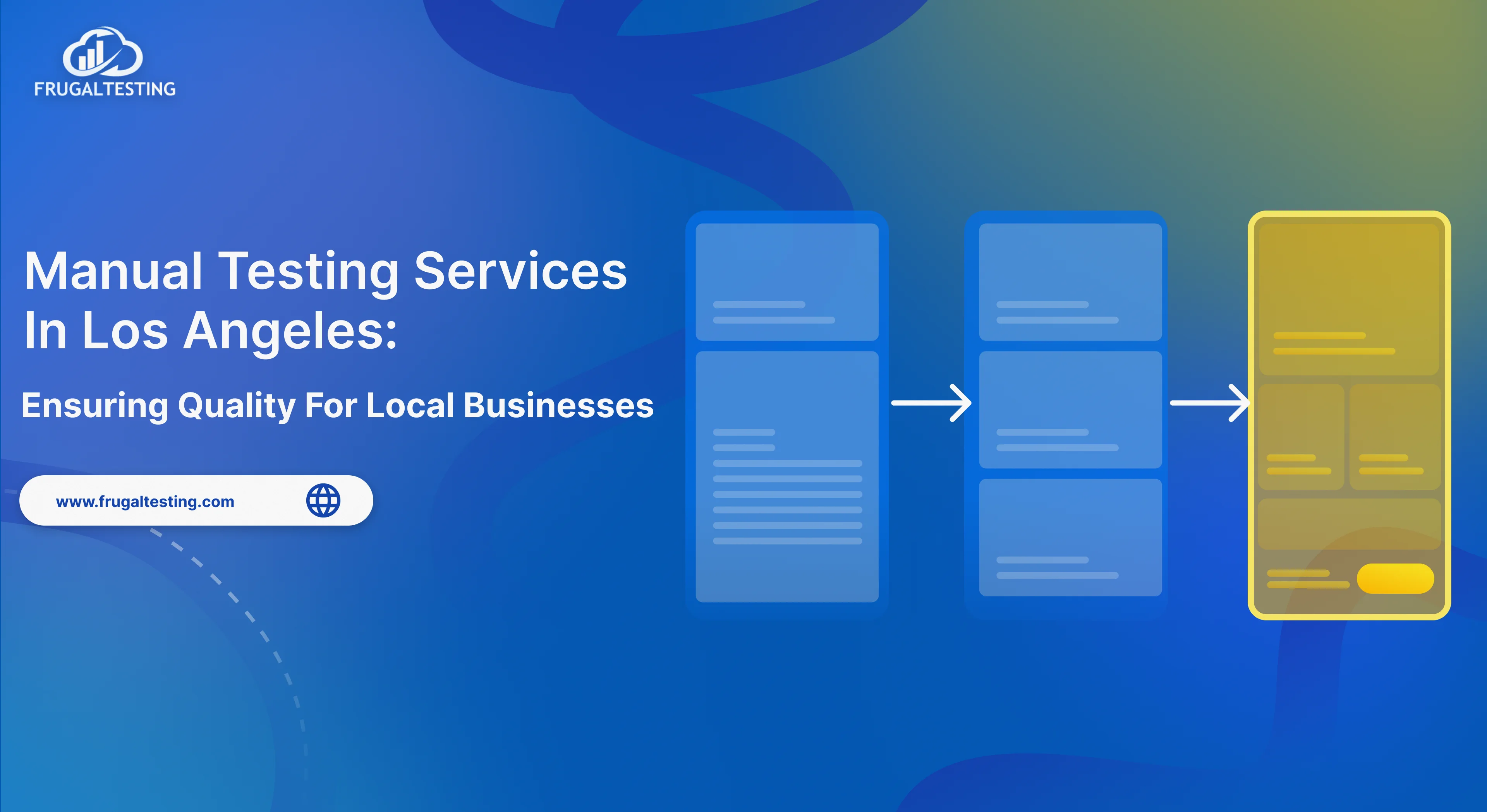DevOps testing plays a crucial role in accelerating software delivery without compromising quality. By combining automation testing, continuous testing in DevOps, and robust DevOps testing tools, teams can streamline the SDLC process and enhance collaboration. From CI/CD pipeline automation to regression testing and load testing, modern practices like Selenium automation testing and API automation testing ensure reliability across builds. Whether using Azure DevOps testing or monitoring with New Relic, mastering DevOps software testing leads to faster, error-free releases. This blog explores key tools, types, and strategies to implement DevOps automated testing effectively.

What’s next? Keep scrolling to find out:
🚀 DevOps Testing Essentials: Understand the role and importance of DevOps testing.
🚀 Key Tool Features: Explore must-have features for effective testing tools.
🚀 Top Tools of 2025: Discover leading solutions like QA Wolf, Reflect, and Opkey.
🚀 Specialized Testing: Learn about k6, New Relic and EMMA for specific needs.
What Is DevOps Testing and Why Is It Important?
DevOps testing is a critical component of modern software development that integrates testing practices directly into the SDLC framework, ensuring continuous feedback and quality throughout the DevOps life cycle. It enhances the speed, collaboration, and reliability of software releases while aligning with agile SDLC methodologies. Here's why it matters:
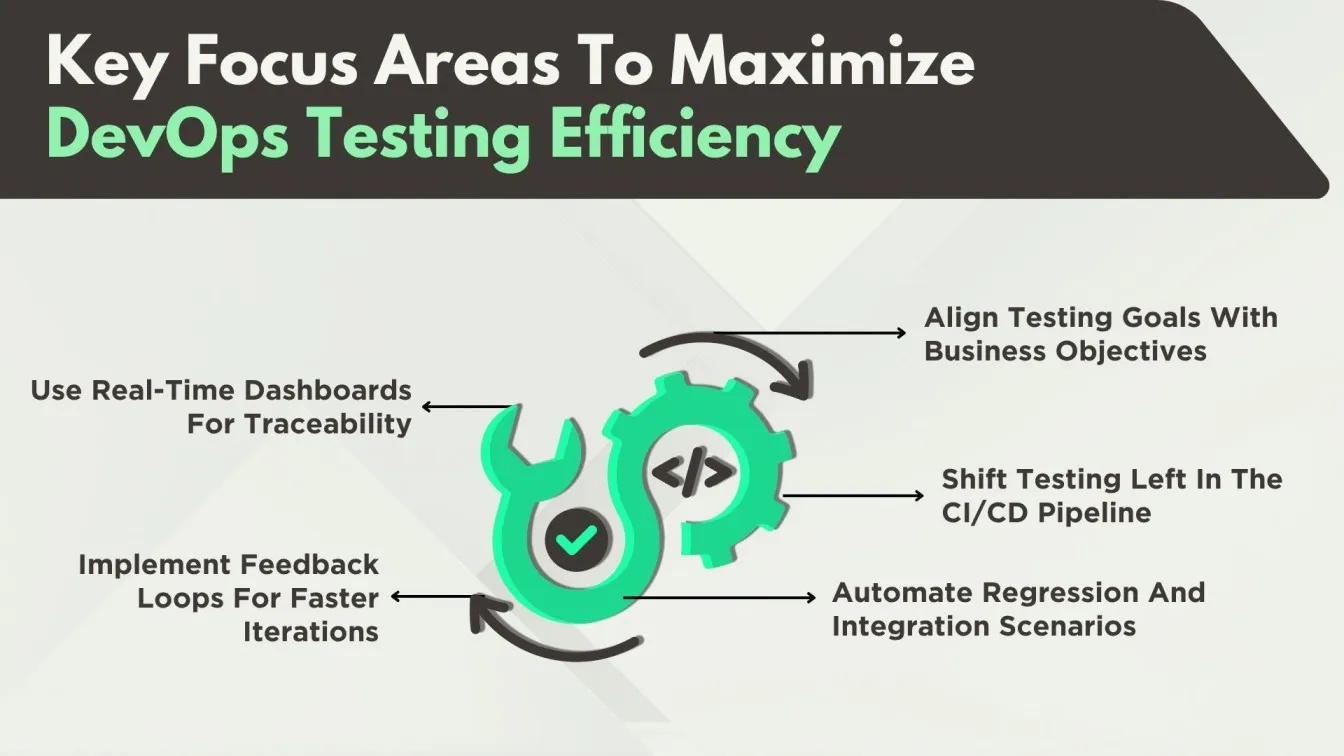
- Promotes DevOps continuous testing for faster issue detection and resolution.
- Ensures seamless integration of QA automation testing across development stages.
- Supports software regression testing to validate code changes without introducing defects.
- Enables scalable regression testing automation for repeated test cycles.
- Facilitates the adoption of automation testing services across the SDLC models
- Enhances traceability and accountability using SDLC tools and pipelines
- Integrates visual regression testing for UI consistency across builds
- Strengthens DevOps software testing with collaborative feedback loops
- Empowers teams to embrace DevOps automated testing for higher deployment frequency
- Encourages innovation while reducing time-to-market and minimizing risks
Key Features of DevOps Testing Tools
DevOps testing tools offer a powerful approach to unify development and QA teams, automate processes, and deliver high-quality software faster. These tools are built to work within agile SDLC models and CI/CD practices, ensuring faster iterations and better collaboration across all phases of the SDLC life cycle.
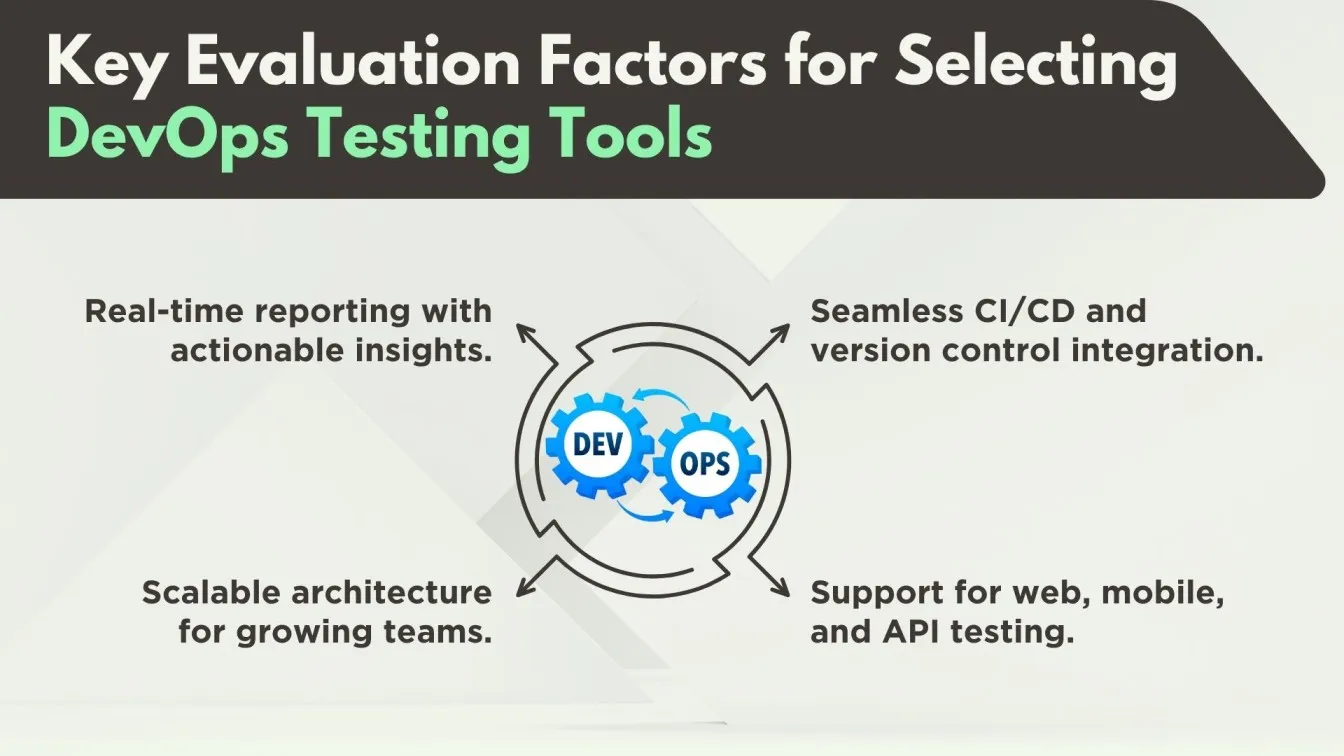
- Efficient Automation Integration: Automation testing in DevOps enables frequent and consistent test execution across builds, thereby reducing human error and accelerating feedback loops.
- Robust Pipeline Execution: CI/CD automation ensures that every code change is automatically tested and deployed, maintaining a continuous and reliable workflow.
- Reliable Quality Gates: DevOps automated testing tools enforce test thresholds within CI/CD best practices to ensure code meets standards before moving to production.
- Platform-Specific Testing: Azure DevOps testing offers native support for managing pipelines, releases, and testing within Microsoft ecosystems.
- Quick Detection of Failures: Visual regression testing helps detect subtle UI issues introduced by new code, preserving consistent user experiences.
Top DevOps Testing Tools for 2025: Overview and Key Features
Choosing the right DevOps testing tools can significantly boost efficiency, reduce manual efforts, and improve the software delivery process. As teams shift from traditional methods to Agile methodologies, automation tools and CI/CD pipelines are essential to support faster delivery and better collaboration. Here are some leading tools in 2025 and their strengths:
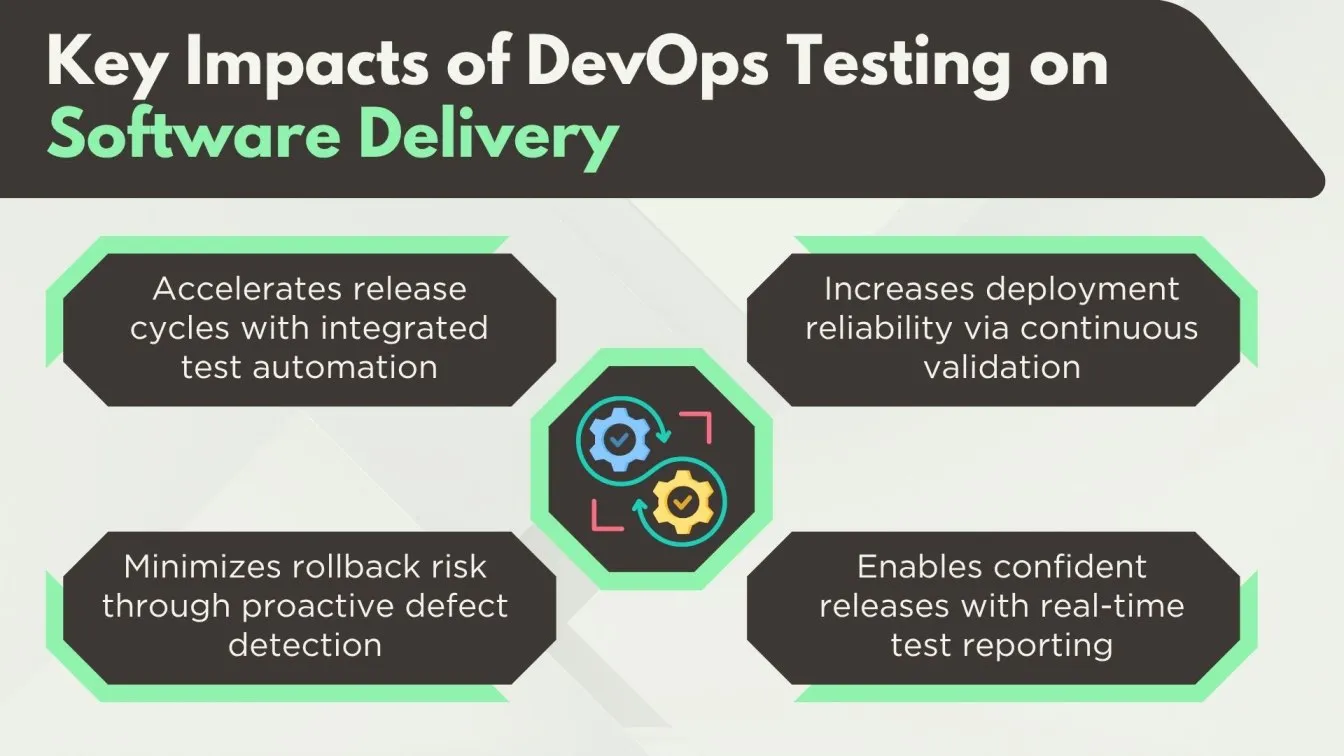
- New Relic: Offers real-time insights into application testing and performance testing across production environments and operating systems.
- K6 Load Testing: An open-source tool that simplifies load testing for APIs and mobile applications with real-time feedback.
- QA Wolf: Offers fully managed test automation with human-verified bugs and real-time test reporting.
- Opkey: Provides no-code test automation with AI-based impact analysis and continuous DevOps integration.
- TestProject: Supports Selenium and API automation testing with cross-browser support and CI/CD triggers.
- AppVerify: Automates functional testing and monitors real-time user interactions in production environments.
- Parasoft API: Uses AI for test generation and supports service virtualization and policy compliance in pipelines.
- EMMA: Lightweight Java tool offering code coverage insights and CI/CD integration for real-time feedback.
QA Wolf: End-to-End DevOps Testing with Expert Support
QA Wolf is a fully managed DevOps testing platform designed to accelerate the software delivery process by combining powerful automation tools with expert QA support. Tailored for modern DevOps practices, it helps streamline the software development lifecycle while maintaining high standards of software quality. Ideal for Agile methodologies and cross-functional teams, it seamlessly fits into any DevOps pipeline.
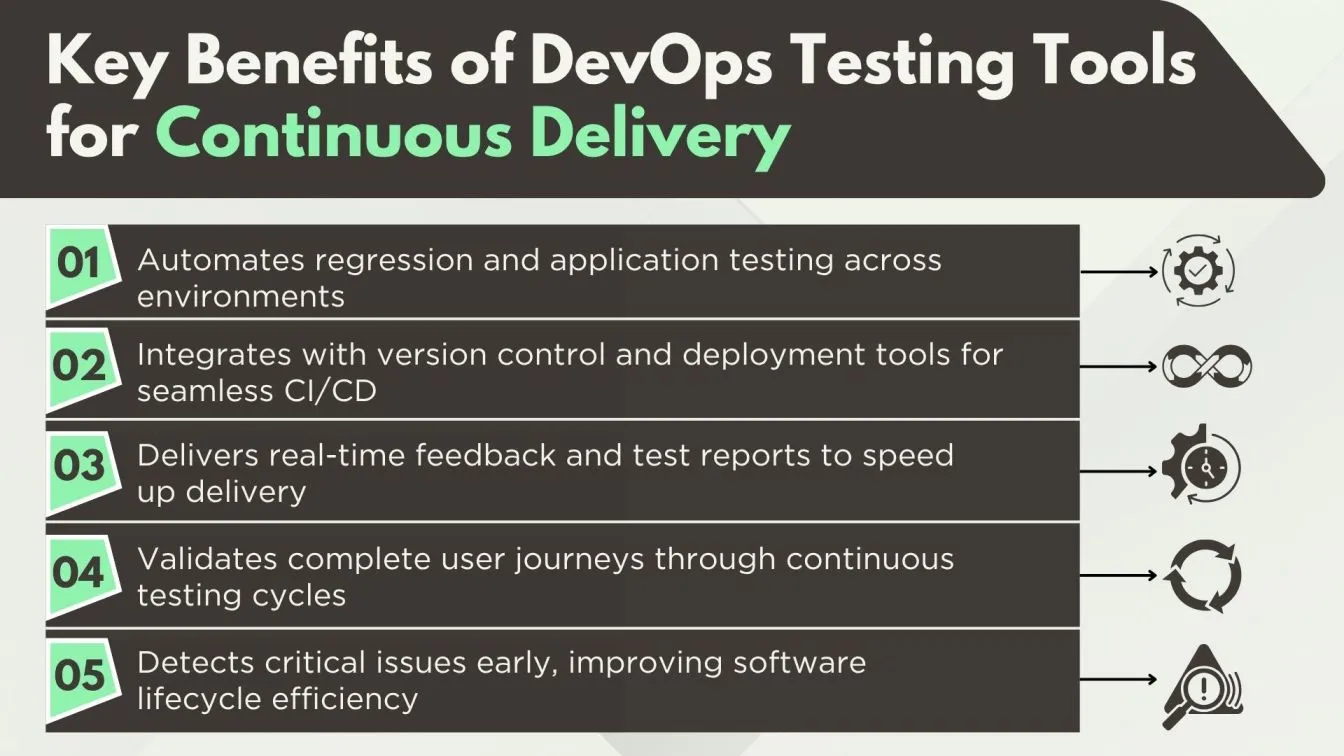
How to Use
- Integrate QA Wolf with your existing CI/CD pipeline to trigger continuous testing automatically.
- Leverage open-source tool frameworks provided by QA Wolf for scalable test automation.
- Collaborate with expert QA teams to execute functional tests, regression testing, and API testing.
- Monitor real-time test results via dashboards linked to version control systems and production environments.
k6 Load Testing for Engineering Focused DevOps Teams
k6 is a modern, open-source tool designed for load testing in high-performance DevOps environments. Ideal for engineering-driven teams, it helps identify performance bottlenecks early in the software development lifecycle. With native scripting and API testing capabilities, k6 integrates seamlessly into any CI/CD process, enabling continuous monitoring of production environments.
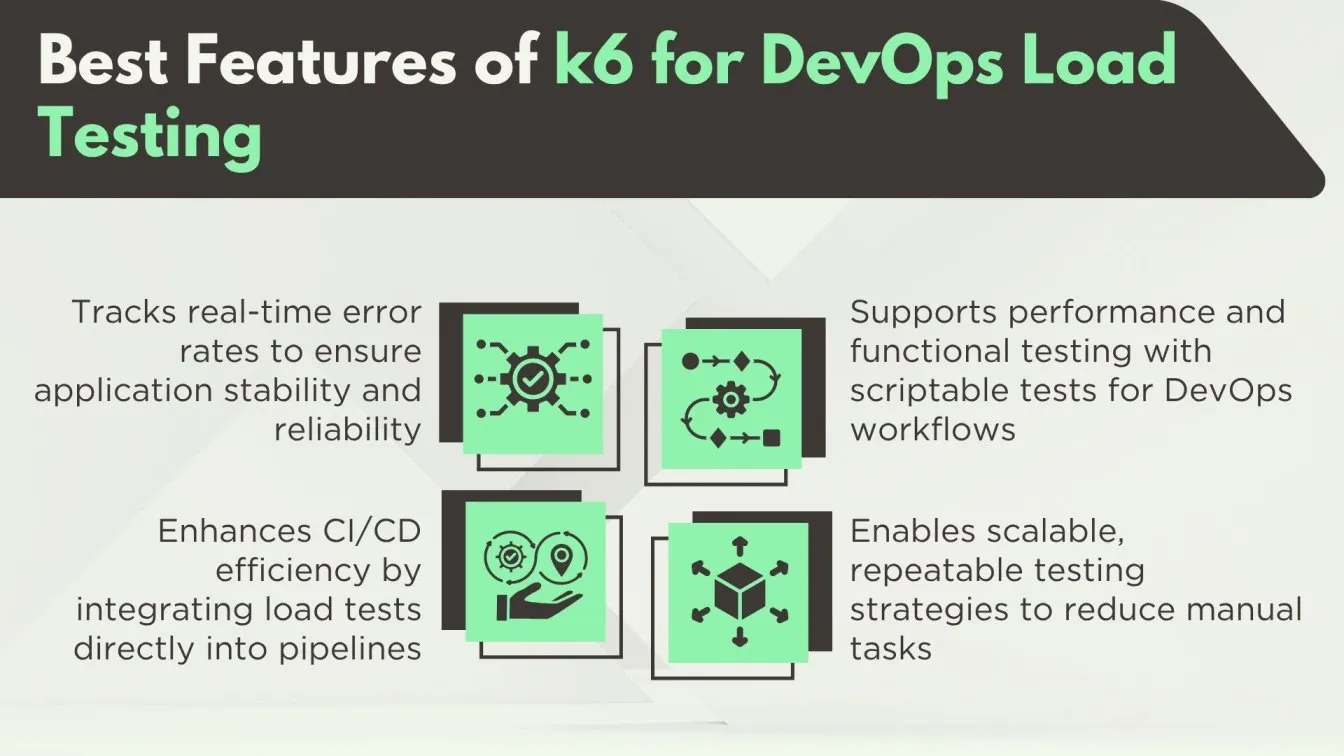
How It Works
- Write load test scripts in JavaScript using the k6 scripting API.
- Integrate tests into CI/CD tools for automated execution.
- Simulate concurrent user traffic across mobile applications and web platforms.
- Analyze results through K6 dashboards for actionable insights.
- Use metrics to fine-tune the deployment processes and improve software quality.
Opkey No Code DevOps Test Automation Tool
Opkey is a powerful no-code DevOps automated testing platform that empowers cross-functional teams to accelerate the software delivery process. Designed to minimize manual efforts, it enables faster delivery of high-quality applications across diverse operating systems without deep coding knowledge. Opkey fits seamlessly into the DevOps environment and supports Agile methodologies and modern DevOps practices.
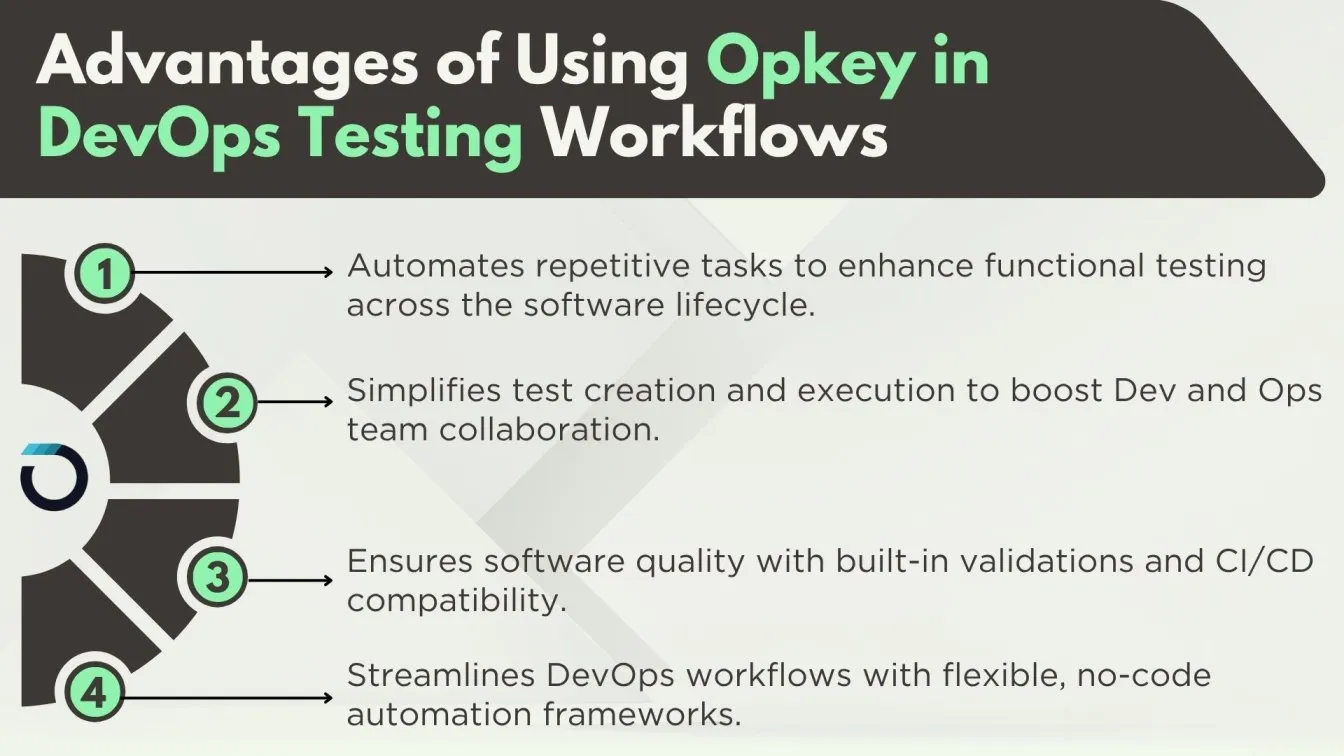
How It Works
- Use Opkey’s drag-and-drop interface to design automated test cases without code.
- Integrate with CI/CD pipeline tools for continuous deployment and testing.
- Run tests across web, mobile applications, and APIs in real-time.
- Gain real-time feedback and visibility into the DevOps process through analytics dashboards.
New Relic Performance Monitoring and Testing in DevOps
New Relic is a powerful observability and performance monitoring platform tailored for DevOps environments. It offers real-time insights into application health, load testing metrics, and user interactions. Ideal for DevOps tools integration and automation frameworks, it supports performance testing, regression testing, and application testing across production environments. New Relic helps operations teams and cross-functional teams detect and resolve critical issues quickly, enhancing the overall software delivery process.
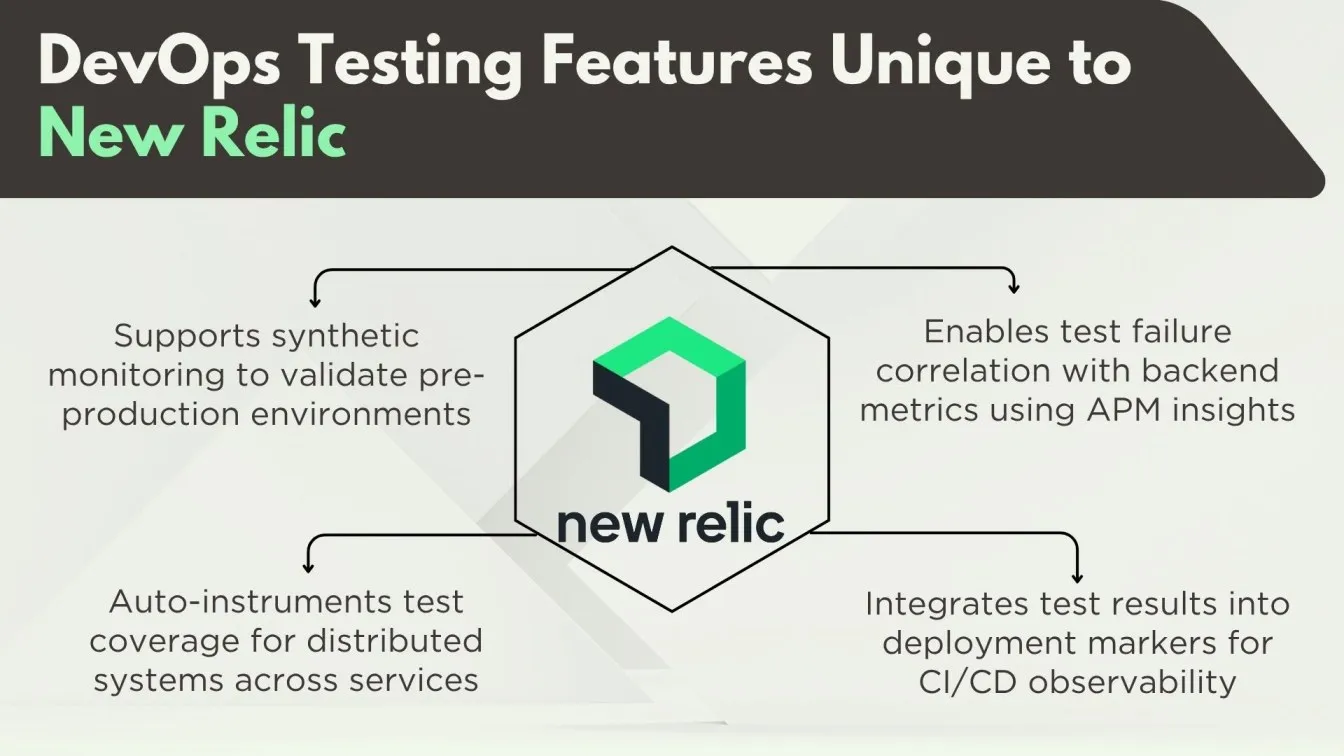
How to Use
- Integrate New Relic with your DevOps pipeline and version control systems.
- Set up performance dashboards to monitor API testing, load testing, and software regression testing.
- Use real-time alerts to track error rates and ensure optimal performance during deployments.
TestProject Community Powered Open Source Test Automation
TestProject is a free, community-driven open-source tool designed to simplify automation testing for DevOps teams. Supporting web, mobile, and API testing, it helps streamline the DevOps process with robust automation testing services. With easy integration into CI/CD pipelines, it empowers development teams to improve software quality while reducing manual efforts. Its intuitive interface and support for multiple operating systems make it a preferred choice for cross-functional teams seeking efficient automation frameworks.
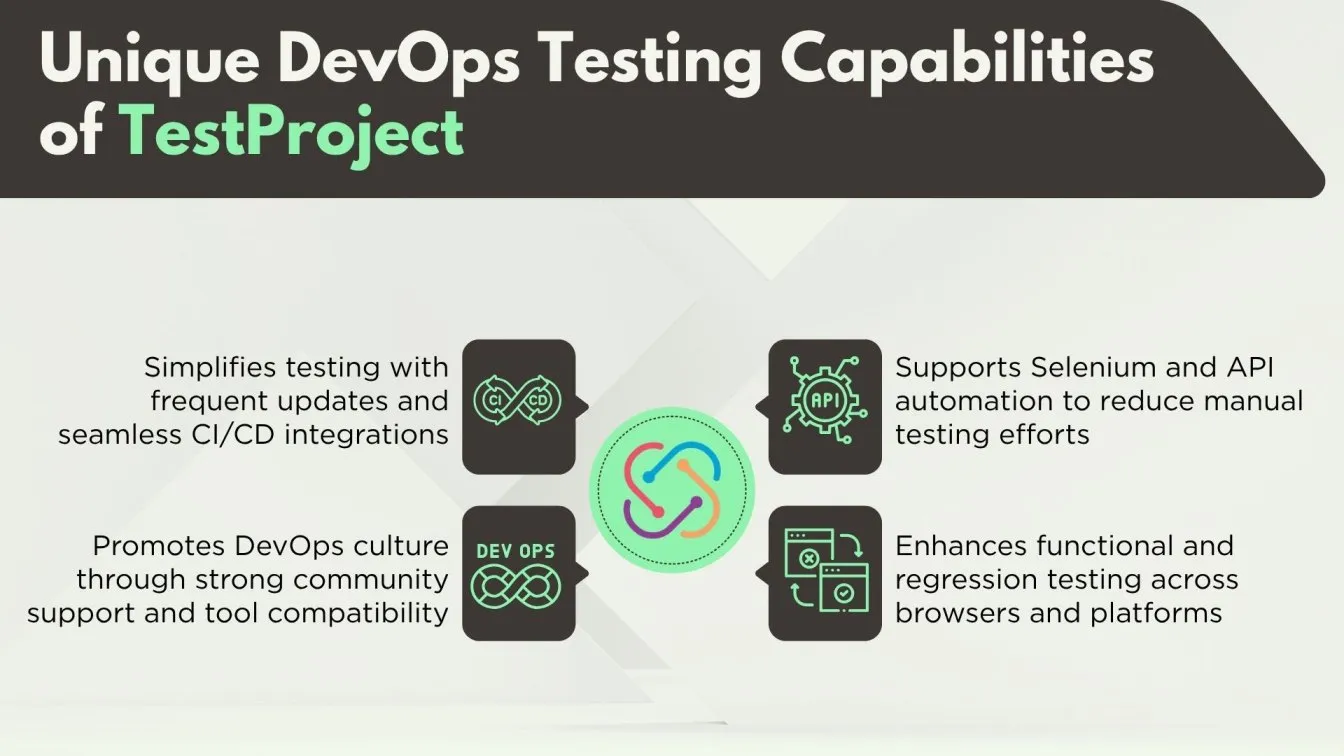
How to Use
- Install TestProject on your preferred operating systems and link it with your CI/CD pipeline.
- Create, run, and manage test cases using its user-friendly automation tools.
- Leverage team collaboration features and community add-ons to extend testing capabilities.
AppVerify Data Driven Functional Testing for DevOps Pipelines
AppVerify is a robust functional testing platform tailored for modern DevOps pipelines, enabling real-time insights and user-centric validation of critical business processes. It empowers development teams to perform data-driven functional tests across various environments, reducing error rates and boosting user satisfaction. AppVerify integrates seamlessly into the software development lifecycle and supports agile SDLC methodologies with minimal manual tasks.
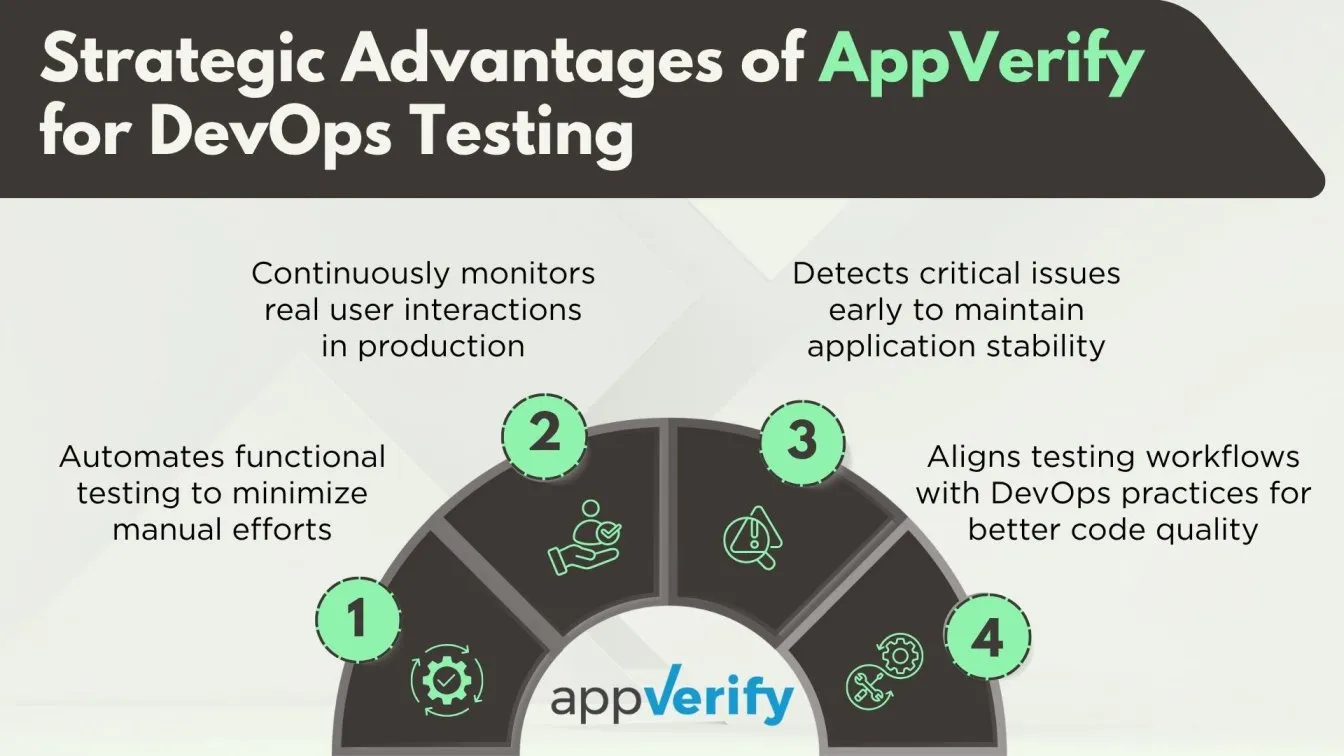
How to Use
- Integrate AppVerify into your CI/CD pipeline within the DevOps environment.
- Configure data-driven test cases for end-to-end application testing.
- Analyze real-time feedback and adjust testing strategies to optimize deployment processes and software quality.
Parasoft API and Web Testing with AI Integration
Parasoft offers intelligent API and web application testing solutions that integrate seamlessly into the DevOps pipeline. Leveraging AI and machine learning, it helps development teams reduce repetitive tasks, enhance software quality, and speed up the software delivery process. Its support for automation frameworks and continuous testing in DevOps environments makes it ideal for both traditional methods and agile SDLC models.
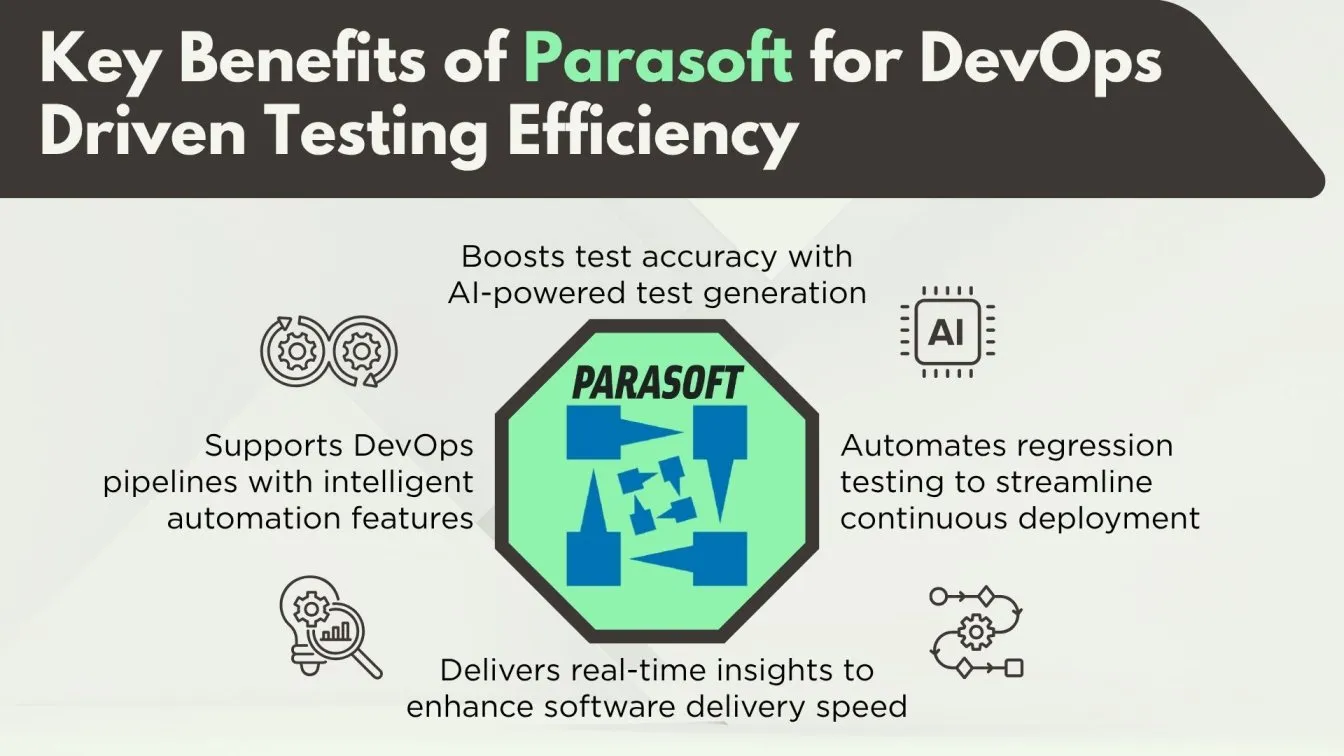
How to Use
- Connect Parasoft with your CI/CD pipeline and version control systems.
- Define test cases for API testing and web application testing using automation tools.
- Enable AI-based recommendations to optimize testing strategies across multiple operating systems.
- Monitor real-time feedback to detect and resolve critical issues during the development cycle.
EMMA Java Code Coverage Tool for DevOps Environments
EMMA is a lightweight Java-based code coverage tool that plays a pivotal role in optimizing testing strategies across DevOps environments. Known for its speed and minimal footprint, EMMA is ideal for development teams working with Agile methodologies and automation testing workflows. It helps track how much code is exercised during unit tests and integration tests, improving software quality.
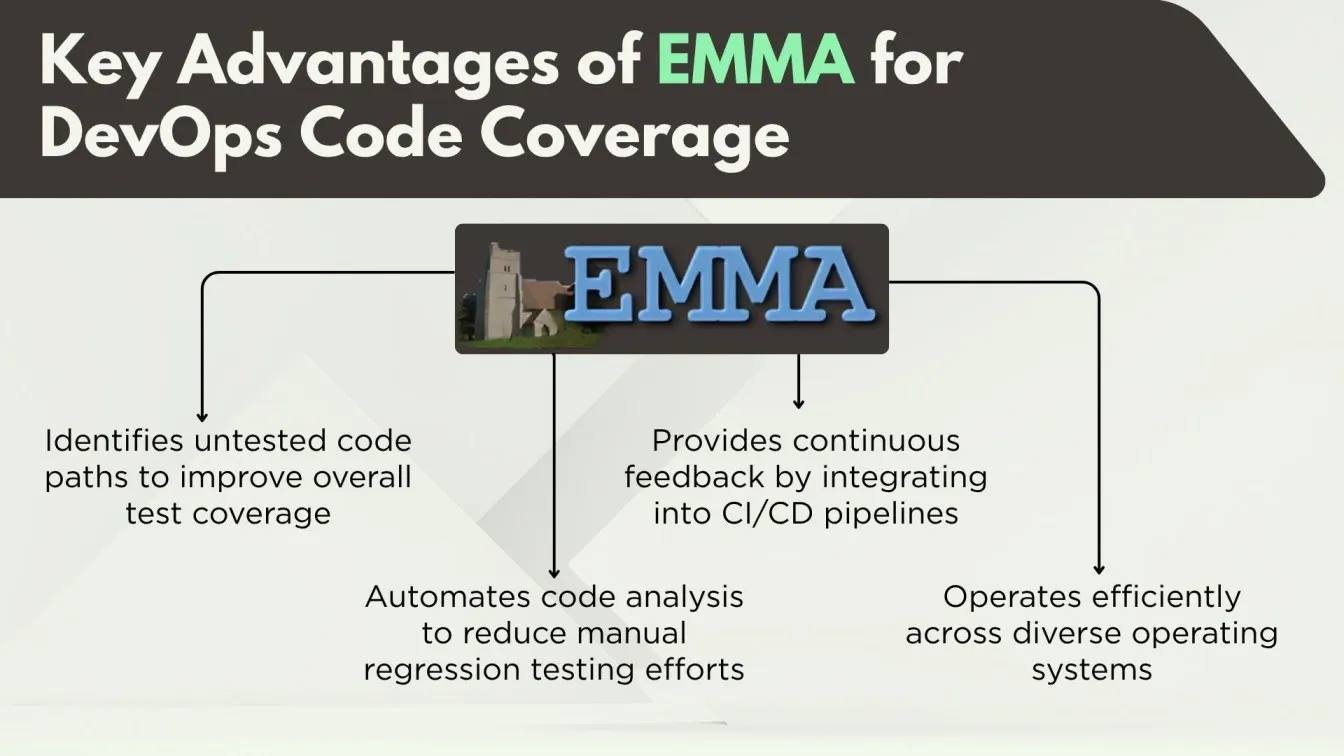
Benefits
- Enhances the DevOps process by identifying untested code paths and improving test coverage.
- Reduces manual tasks in regression testing by automating code analysis for continuous feedback.
- Works efficiently across multiple operating systems and supports integration in CI/CD pipelines.
How It Works
- Instrument Java classes using EMMA’s command-line or ANT integration.
- Execute unit tests to collect coverage data during the software development lifecycle.
- Generate detailed coverage reports with visual metrics for development cycle review.
- Integrate results into DevOps testing dashboards for team collaboration and real-time insights.
Final Thoughts
DevOps testing tools are transforming the software delivery process by enabling faster releases, improved code quality, and smarter automation. With support for automated UI tests, unit testing, integration testing, and end-to-end testing, teams can ensure comprehensive coverage across all test suites. Through continuous integration, test data is validated early, and manual testing is minimized by adopting a reliable test automation platform. These tools also help manage test scenarios, test plans, and test steps efficiently within a central test management system. Integration with monitoring tools allows real-time feedback, while security testing and infrastructure as code ensure safe, scalable deployments. For Java applications, automated tests accelerate defect detection and resolution. Effective time management, strong collaboration between team members, and awareness of body language in communication further support the success of all testing activities within a modern DevOps pipeline.
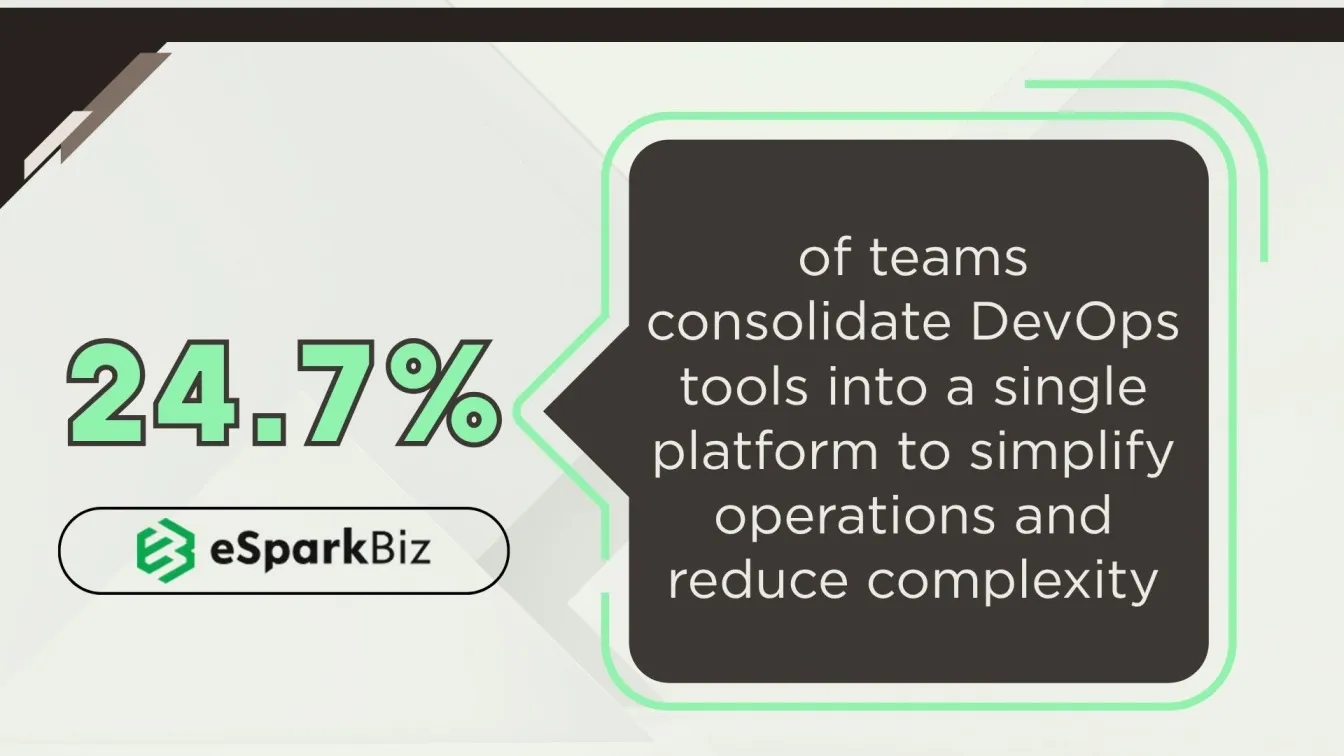
Frugal Testing stands out among top software testing companies in USA by offering AI-driven test automation services, functional testing solutions, and selenium automation testing services tailored for agile DevOps environments. With proven expertise in load testing services and cloud-based test automation services, the frugaltesting.com platform supports QA testing services for enterprises. Recognized for its efficiency, Frugal Testing Hyderabad continues to deliver reliable software testing service provider solutions across industries.
People Also Ask
What challenges do teams face when integrating testing into CI/CD workflows?
Teams often struggle with slow test execution, unstable test environments, and maintaining test reliability across frequent code changes.
What role does observability play in DevOps testing and test reliability?
Observability offers real-time insights into test failures and system behavior, helping teams detect, debug, and resolve issues faster.
How does shift-left testing improve DevOps test strategy?
Shift-left testing identifies bugs early in the development process, reducing costly fixes and accelerating the software delivery pipeline.
How can performance testing be integrated seamlessly in CI/CD pipelines?
Integrate performance testing in CI/CD by automating test runs during builds to detect bottlenecks early and ensure consistent performance.
What are the risks of poor test orchestration in a DevOps environment?
Lack of proper test orchestration leads to delayed releases, higher error rates, and broken builds that impact production stability.



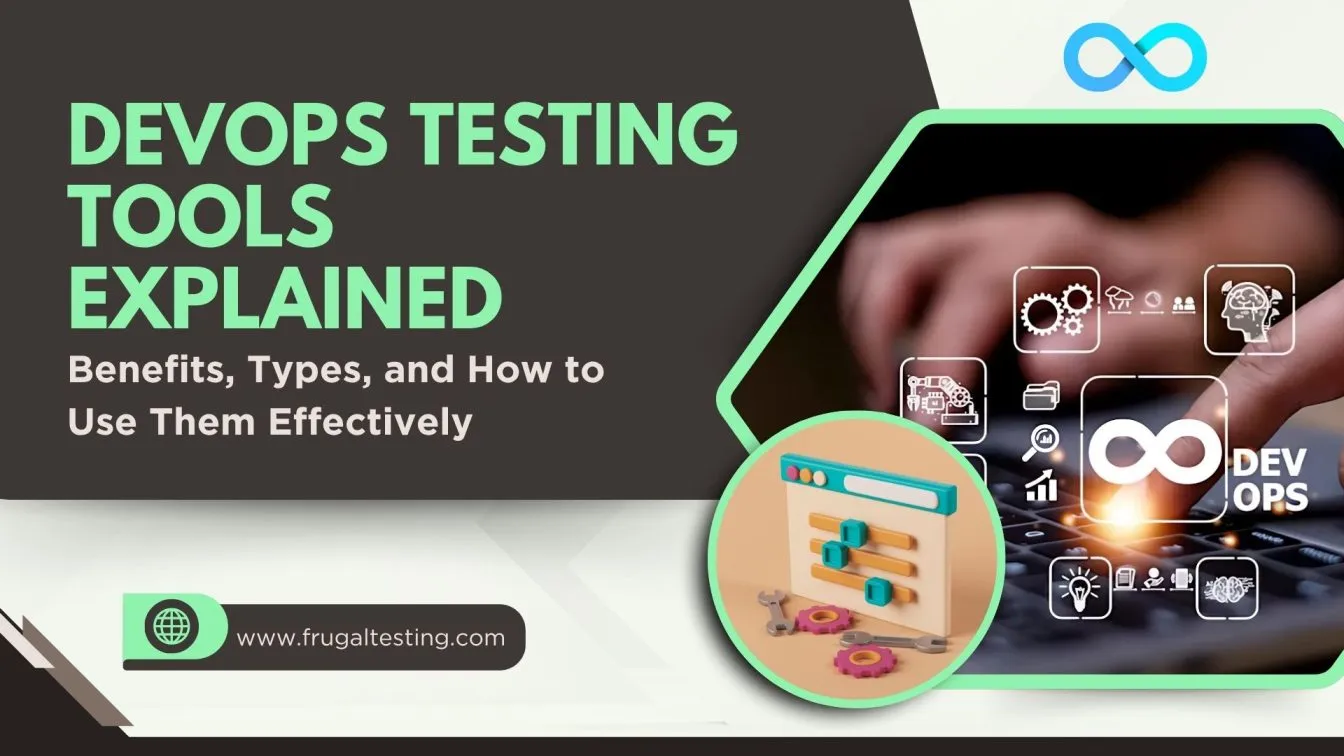

%201.webp)
